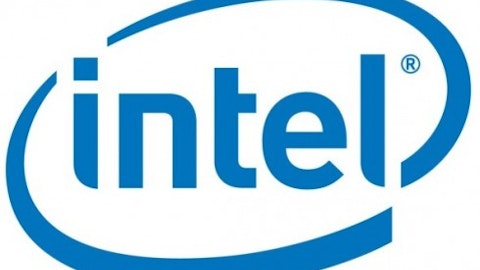In addition to TSMC’s new 20 nm process, the Common Platform alliance, composed of ARM, International Business Machines Corp. (NYSE:IBM), Samsung, and GlobalFoundries, is working on its own 20 nm process and a 14 nm FinFET technology superior to Intel’s current 22 nm. IBM holds many patents related to the FinFET technology, which is also used in the Intel “tri-gate” 22 nm process, so Intel has no exclusive lock on the technology. GlobalFoundries is currently working to bring the 14 nm process on line at its Saratoga County, New York facility. The problem, of course, is time to implementation. Currently, only their 28 nm process is in production.
The Common Platform alliance has been in existence for 10 years. In effect, it has served as a licensing pathway for IBM research developments (such as the FinFET) to get into production facilities. The ARM ecosystem has benefited from this and has been able to more or less keep pace with Intel, although a step behind in process technology. This will be the Common Platform’s most difficult test, since remaining a step behind Intel may no longer be an option.
How much time does the Common Platform and the rest of the ARM ecosystems have? Here, the fact that the ARM ecosystems are very developed with over half a billion users each for Android and iOS may help. Consumers are basing buying decisions on the ecosystem of services for which the device is a portal as much as on the device itself. So, immediate inroads by Windows and Chrome based tablets may be modest and small compared to the overall growth of the tablet market. In this scenario, ARM foundries might have until late 2014.
But, Samsung’s decision on the Galaxy Tab 3 could be the beginning of a wave of defections from Android, especially among Android manufacturers who have had a tough time competing with Samsung and are looking for an advantage.
I believe the 20 nm processes in development at TSMC and the Common Platform partners will be in production in early 2014, if not sooner. Given the onslaught of Intel Haswell and Bay Trail processors in Q4, I expect ARM processor shipments to stagnate if not actually decline in the quarter. This will bring on a long overdue correction in ARM’s share price, as I have been expecting since I wrote “Does ARM Still Have Momentum.”
However, I expect ARM processor shipment growth to resume in Q1 2014 as ARM foundries bring their 20 nm processes on line, and a new generation of ARM processors hits the market.
The article Intel’s Haswell Tablet Breakthrough originally appeared on Fool.com.
Mark Hibben has no position in any stocks mentioned. The Motley Fool recommends Intel. The Motley Fool owns shares of Intel and International Business Machines. Mark is a member of The Motley Fool Blog Network — entries represent the personal opinion of the blogger and are not formally edited.
Copyright © 1995 – 2013 The Motley Fool, LLC. All rights reserved. The Motley Fool has a disclosure policy.



